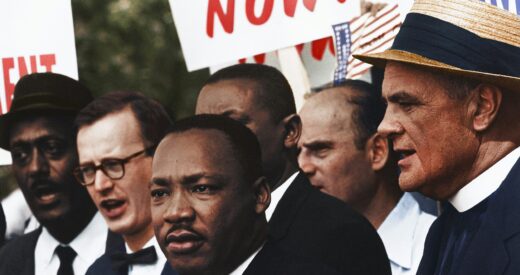My parents were married in 1973, only six years after the landmark civil rights case Loving v. Virginia, in which the U.S. Supreme Court ended prohibitions on interracial marriage in Virginia, among other states.
It wasn’t until recently that it occurred to me how close their wedding was to the Loving case or the courage it took to marry someone of another race at that time, especially for my mother who was only twenty-one.
I recall the first time I encountered a conversation about my multi-racial identity. I was about seven years old, and someone asked me who my “real” father was, since it couldn’t be the White man standing in the driveway of our home. Later in high school, I had to rip into a classmate for saying my parents’ interracial relationship was “against the Bible.” Almost thirty years later, I congratulated him on marrying his husband.
After all, aren’t we all entitled to be happy and to love whomever we choose? In Virginia, as late as 1967, the short answer was no.
After being married in Washington D.C. in 1958, Mildred and Richard Loving returned to their hometown in Caroline County, VA. Months later, they were awakened from their beds in the middle of the night, staring down the barrels of drawn guns, after an anonymous tip. They were arrested and jailed for violating the state’s “Racial Integrity Act.”
The Lovings were sentenced to a year in prison, but a judge released them under the condition that they leave Virginia. Mildred Loving wrote to then Attorney General Robert F. Kennedy for help in returning to their home, and the couple was referred to the ACLU (the American Civil Liberties Union), which represented them in their case.
Eventually, the Supreme Court ruled that state bans on interracial marriage were unconstitutional under the 14th Amendment, which states in part that “no State shall make or enforce any law which shall abridge the privileges or immunities of citizens of the United States; nor shall any State deprive any person of life, liberty, or property, without due process of law; nor deny to any person within its jurisdiction the equal protection of the laws.”
The 1967 Loving v. Virginia ruling nullified sixteen remaining anti-miscegenation laws, all in Southern states. However, some did not formally purge the laws until much later; for instance, Alabama’s legislature did so only in November 2000, with 40% voting against the measure.
June 12—the anniversary of the Loving v. Virginia decision—is now commemorated each year as “Loving Day.” A number of organizations and individuals host Loving Day Celebrations in cities all over the United States, and internationally in cities like Tokyo and Barcelona. Today, according to the 2020 census, more than 33.8 million people identify as multiracial, reflecting the surge of interracial relationships across the United States.
Before her death in 2008, Mildred Loving said, “Surrounded as I am now by wonderful children and grandchildren, not a day goes by that I don’t think of Richard and our love, our right to marry, and how much it meant to me to have that freedom to marry the person precious to me, even if others thought he was the ‘wrong kind of person’ for me to marry.”
Marrying who you fall in love with should be an inherent right for us all, but even into this past decade, we have struggled with finding humanity in love beyond the confines of antiquated and biased social norms. It’s imperative that we continue to educate ourselves and each other on the inequities that have existed in our society and those that still exist today, and work together to upend them. We should continue to remember the lesson in Loving.
To learn more about Loving Day, you can:
- Watch the movie Loving
- Read Loving Day by Mat Johnson
- Share The Case for Loving with your kids
- Visit LovingDay.org
- Search #lovingday
Jackie Ferguson hosts the Diversity: Beyond the Checkbox podcast and is Head of Content and Programming and a Co-Founder of The Diversity Movement.






